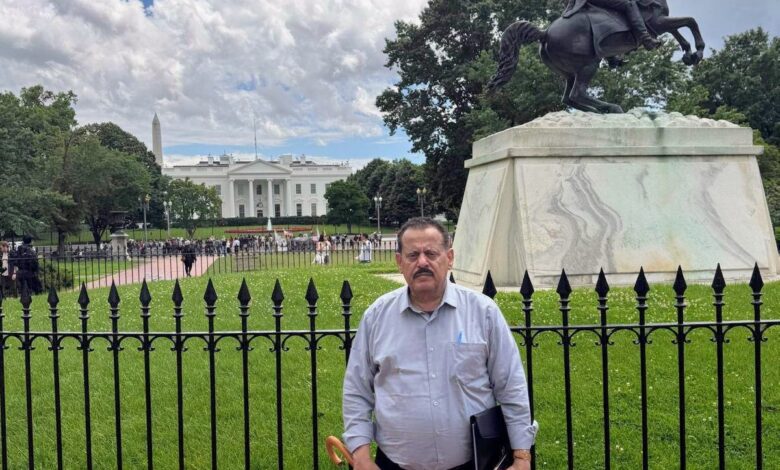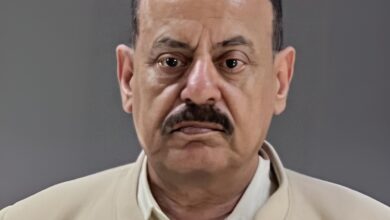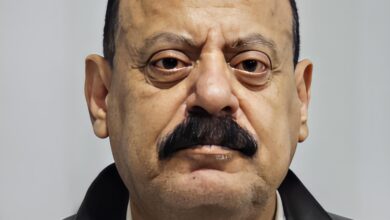A Failure in Writing Stories

Yemeni mp
Ahmed Saif Hashed
I always felt that the military wire was not the shore I was searching for, nor my resting place for the rest of my life. It would never be my final station. I often sensed a void seeking to be filled, or perhaps I was the one searching for it. I sought my own identity, exploring within for my next destination. I constantly tried to rediscover myself, and when I couldn’t find it, I ventured toward new paths in hopes of uncovering it.
I attempted to write a short story thirty-six years ago, but I failed, and I stopped writing altogether. Today, I return to pen my story. Perhaps it is the failure that Henry Ford spoke of, granting you a new opportunity to start again, but this time with greater wisdom. It is a return after decades of longing. More importantly, this is not just my story; it is also the tale of those whose stories I failed to write—those I strive to represent and to whom I belong.
Today, I summon their stories within the breaths of my own, inspired by the pulse of my loyal pen. I aim to employ a technique that may defy conventional standards and rules, but most importantly, I seek to touch the heart, provoke awareness, and create a lasting impact in memory.
I will write about myself, about the impoverished, the weary, and the honorable fighters in my homeland. I will recount their endless suffering, the minds ensnared by “opium,” the thick darkness that burdens consciousness, ignorance, and the forces that undermine the future. I will write about their usurped homeland, their slaughtered unity, their betrayed revolution, their dreams that were stolen, and their lost future. I will write all this without losing hope in reclaiming what has been taken.
I will write about war and peace, the system of savagery, and the unjust world. I will speak of the wretched and the tortured on this earth, and the countless victims. I will write about those whose dignity has been violated, whose rights have been squandered, and whose dreams have been trampled.
I will write about hunger, ignorance, suffering, and those whose homelands are ravaged, and about those who have neither home nor refuge. I will write about prisons, cells, and torture, the cruel oppression and tyranny I have lived through, witnessed with my own eyes, or conveyed through eyewitness accounts.
Despite the passage of more than three and a half decades, I assert that I remain loyal to the common people and their just causes. I will do my utmost to write about love, beauty, passion, joy, and life. I will write about sorrow and regret, childhood, youth, school, and university. I will address the rampant corruption, the corrupt, and the ugly politics stripped of even the barest minimum of ethics, and the ignorance that has dominated and led to tyranny.
I may err here or there, but who does not make mistakes? I have my good intentions as an excuse, but most importantly, I strive to be faithful to the victims until my last breath.
I assert that all or most of my positions, my biases, and my alignments have always been for them: I am the poor dreamer born among them, who lived for them, and will die faithful to them and their just causes. I carry their message and contribute in whatever way I can to liberate their consciousness from delusion and alienation, and to free their reality from poverty, injustice, and oppression.
My consciousness was shaped amid suffering, and my humble reading has refined my sensibilities, making me first and foremost belong to humanity wherever it may be. My allegiance will always be to the just causes of the poor, the destitute, and the lost souls wandering in search of a dignified life, lost dignity, and the freedom that reaches for the skies, as well as the future we aspire to.
I read early on the novel “The Village of Batul” by Mohammed Hanayber, and my eyes often shed hot tears of salt as I immersed myself emotionally in it. To this day, the image of that raped girl lingers in my mind, as does the tale of the black maid who was assaulted in one of the stories by the Yemeni novelist Mohammed Abdulwali. In Abdulrahman Munif’s novel “East of the Mediterranean,” the story of Rajab remains vivid in my memory. Rajab spent five years in an Arab prison, enduring physical and psychological torture that surpassed the horrors of the Day of Resurrection. Additionally, in Ghassan Kanafani’s “Men in the Sun,” the tragedy of the three men—Abu Qais, As’ad, and Marwan—and their sorrowful, tragic end, which concluded with their deaths inside a metal tank and their subsequent disposal in a landfill, resonates deeply. This symbolic novel captures a part of the suffering and tragedy of the Palestinian people.
In the Brigade of Unity, I attempted to knock on a door that I later realized was not meant for me. My first attempt at writing a short story was on 30/5/1984, titled “Waiting Again.” This endeavor reveals the paradox of the exhausted, burdened poor, weighed down by taxes and oppression, and Sheikh Ahmed and his oppressive authority, which the people rebelled against once they could no longer bear it. The victory of the revolution, however brief, was then assassinated five years after its birth and resistance, by a coalition that restored the previous order, albeit in a different guise. Thus began the wait once more for a hero to arrive at dawn, riding his steed, brandishing the sword of victory, and carrying distant hopes and broad dreams.
This initial attempt was published in Al-Raya newspaper on September 30, 1984, in the literary section, after four months of waiting for its release. However, a typesetting error that misarranged the pages left me feeling disheartened and disappointed, as the story began in a distorted and incomprehensible manner. This significantly diminished my joy. Nonetheless, I considered the mere act of publication a victory that softened the blow of my disappointment, as it represented hope for future opportunities to create and share more.
Yet, when I subsequently submitted several attempts at writing short stories, they were not published. I felt that storytelling was not my domain, that I was not a knight in its field, nor would I ever be. I believed I was still too far from mastering its techniques and wielding the pen effectively. Consequently, I turned away from it after repeated failures. Today, after 36 years, I attempt to return, bringing with me a wealth of knowledge and perhaps a more intelligent approach than before.
My second attempt at writing a short story came on November 5, 1984, titled “Loyalty Until the Last Breath.” In my view, it was below the standard for publication, but it remained a part of me. In it, I likened Yemen to “Rinda,” my first love and the name of my daughter today. The story opened with her possessing the heart of her enchanted beloved, a knight of her dreams from “Shar’ab” in Yemen, known as “Mustafa Al-Barzani.” He was a true hero, aligned with the poor and the destitute, standing for the values and principles he believed in. The narrative depicted several scenes between him and the jailer, and the interrogating officer, detailing the severe beatings and torture Mustafa endured in cells, detention centers, and interrogation rooms. It illustrated how he remained adorned with pride, defiance, and challenge in the face of his tyrannical oppressors, ultimately transforming the courtroom into a place of accusation against his captors, only to end with his execution.
The story recounts his loyalty to his beloved “Rinda” until his last breath. Overall, that attempt was a fragment of me, perhaps echoing elements deep within.
On November 27, 1984, I penned another attempt titled “A Call for Help, Again.” I began with: “The night lingers, refusing to leave the city, and the nightmares of the Middle Ages nearly stifle breaths. The triad of evil deepens the sky’s darkness. The clock points to one o’clock past midnight. A dense darkness envelops the poor neighborhoods, suffocated by misery, cloaked in a fabric woven from the rituals and dullness of the clergy and the wealthy. All the anguished, yearning eyes are drawn to the horizon, longing for what lies ahead. The faces of the poor are grim, overflowing with a yearning for the future.
A glimmer of hope pierces through the crowd of despair, penetrating the consciousness and depths of the weary, dispelling the word “impossible.”
This attempt begins by depicting reality and then the glimmer of hope that gradually grows to dispel what once seemed impossible. The center, burdened by the weight of the poor, the miserable, and the deprived, is seized. The night withers away as dawn stretches across the expanse of the city, and the day shines brightly, bringing joy to pale faces. Yet, this state does not last long; dark clouds soon invade the city’s sky, plunging it once again into severe suffering. Nevertheless, the burning hope for an impending victory remains unextinguished.
On March 25, 1985, I wrote an attempt titled “Against the Will of the Enemies,” narrating a journey of struggle toward unity, culminating in the sun sending its rays to every shard of earth, bringing renewal, unity, and life. I began with the acknowledgment that they knew well the path they had chosen was long and arduous, costing them dearly. Yet, they remained equally confident in their eventual arrival; distances diminish, no matter how vast, as long as there are loyal souls willing to sacrifice, give, and practice selflessness, possessing the capacity to initiate and persist in facing dangers, overcoming hardships, and striving for the happiness of their children and grandchildren.
Overall, it was always the poor, the honorable, and the loyal who were most present in my few attempts, and I found myself leaning more toward them. Most of these attempts recount the state of affairs before the revolution of September 26 and after it, as well as the assassination of the revolution on November 5, 1967.
Although all my attempts at storytelling lack artistic standards, they reflect a part of me, however imperfect. They embody my feelings, my sentiments, and the essence of those who are poor, destitute, and hardworking. These attempts are infused with a yearning for ideals, values, dreams, and the spark of hope resistant to extinguishment.
I could not forget, nor resist the desire and longing; I found myself trying once again, even after decades when I thought I would never return or attempt again. In this regard, the Brazilian novelist Paulo Coelho once said, “A person can never stop dreaming. We often see our dreams dashed and our desires thwarted, but we must continue to dream, or else the spirit within us dies. Everyone has the right to fail from time to time, but the one thing they cannot do is forget that. When we truly want something, the entire universe conspires to help us achieve our dream.”
I believe something of this nature has indeed occurred, in one way or another.






